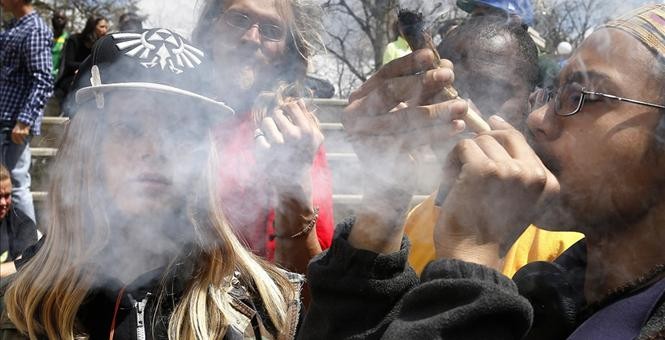By Aron Ravin This article appeared in the National Review on August 14, 2021.
At the outset, I’d like to lay my cards out on the table: I despise weed. I think that I reeks, that it’s a waste of money and time. I dislike cheap euphoria, and I think getting high promotes escapism. Forever a nudnik, I do not, and do not plan to, partake in the devil’s lettuce.
Nevertheless, many people whom I respect and consider my friends are more open to Miss Mary Jane than I. So I take their arguments seriously when we discuss the issue of legalization. Some of the most common ones, which I’ll discuss at more length below, appear tenable on the surface, if not particularly convincing. Others that have tended to exist on the periphery of the debate — e.g., concerns about a nanny state and the problems of disproportionate sentencing — are much more compelling.
That said, the old-fashioned, party-pooper folk with whom I find myself sympathizing tend to fall back on one point: Weed is unhealthy. Since 2002, the proportion of Americans twelve and older who reported having used marijuana in the last year has increased by over 60 percent. Recently, the American Lung Association has been trying to reduce the ever-increasing number of marijuana users, many of whom consume the drug via inhalation. Pot smoke can cause lung cancer in the same way tobacco can, and secondhand marijuana smoke may have even more carcinogens than cigarettes. Marijuana smoke can also compromise the immune system, and there’s a growing amount of scientific literature indicating a significant correlation between any form of cannabis consumption and psychosis.
To their credit, many marijuana users (both medicinal and recreational) are well aware of the risks. They simply believe they should be entitled to make their own health decisions. Unfortunately for them, however, not everyone can be swayed by appeals to liberty.
Generally speaking, things in the United States aren’t just legalized for laissez-faire reasons. The Leviathan is as slow as it is large, so those angling for major reforms usually can’t rely on ideological arguments alone to build political will; they need tangible benefits to point to, or at least evidence that the tangible harms can be mitigated, before politicians will risk supporting them. The support for ending Prohibition, to take one famous example, was sparked in part by antipathy toward the mobsters who had accumulated wealth and power from bootlegging.
The movement for recreational-marijuana legalization is fueled by much the same train of thought as the movement for the 21st Amendment was. Advocates claimed that legalization would cripple the black market and weaken Mexican cartels. They argued that legalizing weed would reduce children’s access to it, as licensed distributors would have a greater incentive to card than criminal dealers, and that users would actually be healthier, as the government would be better able to regulate and inspect the stuff they were smoking. The libertarians at the Drug Policy Alliance waved aside critics who said use would increase with legalization. Top that all off with the Cato Institute’s promises of billions of dollars in new tax revenue and billions more in law-enforcement expenses saved, and you’d have to be silly to disagree.
But the libertarians got it wrong.
Most of the predicted benefits rested on one assumption: that legal weed would render criminal dealers obsolete much in the same way that repealing prohibition weakened bootlegging mobsters. But that has not happened. It has been nearly a decade since Colorado became the first state to legalize recreational marijuana, and the state is dealing with a larger black market than ever before. Drought-plagued California, never to be beaten, has over 5.4 million gallons of water stolen by illegal growers every day. (For perspective, that’s enough to cover the daily needs of almost 70,000 people.) Upwards of 80 percent of all of California’s marijuana sales go through the black market. Massachusetts (70 percent) isn’t faring much better, and Nevada is growing desperate.
Other predictions have also fallen flat. As this chart from the Cato Institute shows, states that have legalized recreational marijuana have experienced major spikes in usage, far outpacing national trends. (For context, the proportion of Americans who reported having used marijuana in the previous year increased from 17.8 percent in 2015 to 20.8 percent in 2019.)
This does not seem to be mere coincidence. Life has gotten easier for illegal growers, not harder, as legalization has spread. Riana Durrett, a Nevada cannabis regulator, explains that legalization has prompted law enforcement to deprioritize marijuana crimes, which has allowed the problem to spiral out of control. Legalization bills have also permitted individuals to grow cannabis on their own, which in turn allows for the creation of far more potential unlicensed sellers, and makes it harder for police officers to be able to tell who is breaking the law and who isn’t.
In hindsight, the fact that legalization would backfire so spectacularly is almost obvious. Both the data and my joint-friendly peers admit that the chill ganja of the hippie era was replaced by new, harder-hitting strains a long time ago. THC levels in pot today are anywhere from five to 50 times as high as they were in the ’70s. Young people increasingly just want to get high on the cheap, and illegal weed in a legal market is as cheap as it gets. The combination of greater potency than ever before and greater access than ever before is an obviously dangerous one.
Of course, libertarians are nothing if not willing to stick to their guns. Legal dispensaries simply cannot match the low prices offered by their criminal competition when they’re being stifled by so much regulation and taxation, legalization advocates say. Yet weren’t generating tax revenue and protecting users major arguments for legalization in the first place?
Again, I take my libertarian, pot-smoking friends seriously. Their anti-paternalistic arguments can often be persuasive. But they got this one wrong.

